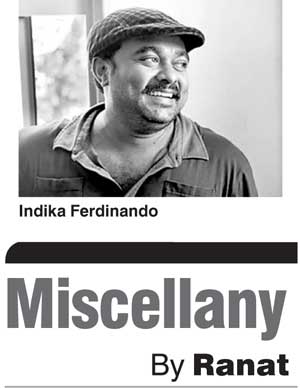Tuesday Feb 17, 2026
Tuesday Feb 17, 2026
Saturday, 3 December 2016 00:00 - - {{hitsCtrl.values.hits}}
Unveiling his talent as a film director, a seasoned theatre personality makes his mark and has been amply rewarded for his maiden effort both at local and international level. 
Starting his interest in theatre while in school at Ratnapura when he wrote a play, directed it and acted in it, he is well-known in the theatre world. In theatre he found he was taking his message to a limited audience. He wasn’t happy. He thought of a making a film so that he could reach a wider audience. The result: a highly successful cinematic creation.
Indika Ferdinando is the creator. He is a senior lecturer in Performing Arts reading for his PhD. ‘Ho Gaana Pokuna’ is the film he created with a catchy title of what was described as a children’s film but lapped up by mature audiences. The message Indika conveys touch their hearts. The theme is simple. The acting provides superlative entertainment. It has a freshness not seen in many Sinhala films.
As he once said at a news conference (in Goa where he film was being screened), Indika’s interest in making a film was the fulfilment of a longing to share his views and feelings of life and the world with a larger audience. He confessed that he tried to achieve it through the guise of a children’s film.
In a subtle way he conveys the message not to neglect remote areas and on the need to provide facilities, particularly education for the rural children in order to make them useful citizens. He conveys this message using a female graduate who gets her first appointment as a teacher in a rural school and proves to her colleagues that it’s much better to rough out in a distant place rather than doing street protests in the city.
As kids we loved going to see the ‘Ho Gaana Pokuna’ – the often-used word to identify the ‘muhuda’ – the sea. At first it was somewhat of a frightening sight – the waves coming towards you making a huge noise. We loved to walk on the beach, watch the wave come towards us, go behind the wave as it receded, touch the water with our feet and run back as the next wave came behind us. Making sand hills on the beach and watch those disappear when a strong wave washed them away was a sad but thrilling experience.
That was several decades ago. The mood has not changed. Today’s kids get the same thrill. This is well depicted in the film when we see the excitement of a blind girl in a remote school when the teacher describes the sea. And they go on a school trip to the see the ‘Ho Gaana Pokuna’.
The highly entertaining film continues to win awards as the best film screened in 2015. Director/script writer Indika Ferdinando has won awards as Best Director at three local festivals up to now. He also won the SIGNIS award for Best Screenplay.
Climaxing the awards won so far, the film gained recognition at the recent SIGNIS Salutations winning seven awards and two nominations. At the other local film festivals held so far, it won four awards and five nominations at the Derana Awards 2016 and six awards and five nominations at the Hiru Awards 2016.
In addition to four international awards – starting with the Chicago International Children’s Film Festival – it has so far won 17 awards and 13 nominations locally.
It’s all the more creditable because it’s a virtually unknown team that created the simple but highly-absorbing film. The players are not the glamorous or the better known ones. There is no romance. Of course, Jayalath Manoratne plays an award-winning role – (Best Supporting Actor thrice) as a bus driver enjoying a drink in the evening, and Lucien Bulathsinghala in the role of head master. They never disappoint us whether on stage or screen (big and small).
A relatively newcomer, Dinesh Subasinghe bagged awards for Best Original Score at all three local festivals and in one, the award for the Best Movie Song as well.
Anasuya Subaainghe playing the female lead role as the teacher keen to uplift the children won a nomination at the Signis Awards.
‘Ho Gaana Pokuna’ portrays the village environment candidly. In the remote village the people rely on the only private bus to get about. The villagers depend on their crops. They work in the field or the chena and gather at the boutique for a chit chat enjoying a cup of plain tea and ‘kitul hakuru’. The mudalali’s wife is the only seamstress in the village. The school headmaster hailing from the village manages with the limited resources. Most of the time he is the only teacher since teachers are reluctant to stay on.
Watching the film, I went back to the days of ‘Handaya’ – the first children’s Sinhala film made by Titus Totawatte with Henry Jayasena doing the lead role. It depicted how the children grew up in the urban environment.